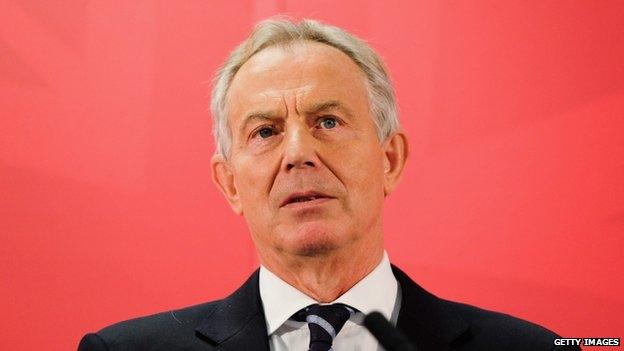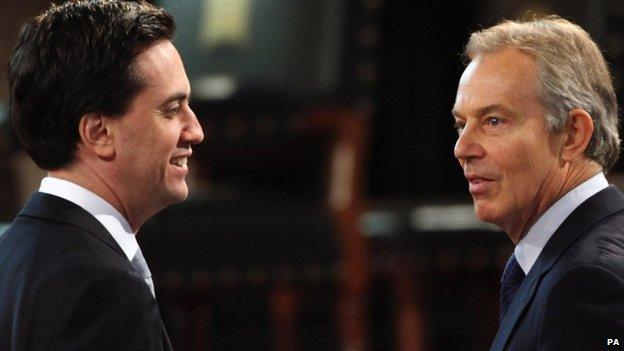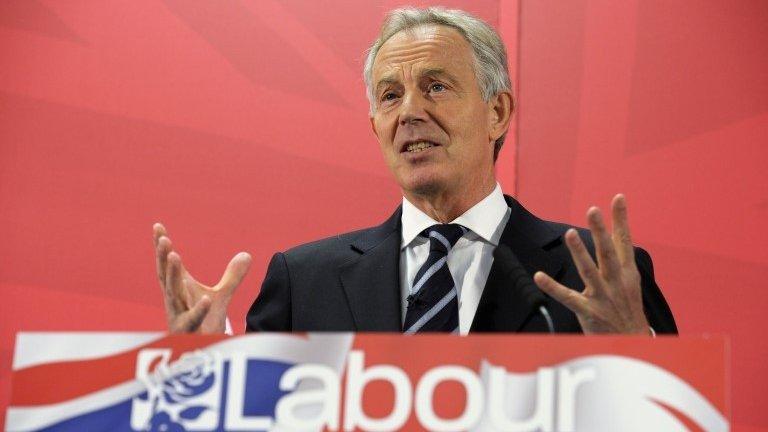Europe: Why you can believe Blair - on this
- Published

Not so long ago I invited Tony Blair to say that Ed Miliband was a strong leader.
He side-stepped the question - choosing instead to say that it was up to voters to decide.
So, should we take what he has said today with a massive pinch of pre-election salt? The answer, I believe, is no.
Love him or loathe him, the former prime minister has said what he thinks today - nothing more, nothing less - on both his successor as Labour leader and what is one of the critical issues facing the country at this election.
It's no secret that Blair is no fan of his successor.
Why would he be? Ed's rationale for standing against his brother was because David Miliband did not represent the break with New Labour that he believed was needed.
So, whether on the deficit, public spending control, reform of the public services - let alone matters of peace and war - there is a gulf between them. No wonder they chose not to appear together to give journalists the chance to remind them of all they've said about each other.

Tony Blair (right) said on Tuesday he 100% supported Ed Miliband (left)
But - and it is an important but - the former prime minister knows that Ed Miliband came under sustained pressure to match the Tory promise of an EU referendum.
He was told "you can't afford to oppose giving people a say, you'll never face down the pressure from the press, a referendum's inevitable" and more besides.
Even some pro-Europeans joined in arguing that this was a chance to close the gaping wound that had been open for decades by settling Britain's place in the EU once and for all.
Tony Blair had come under precisely the same pressure more than a decade ago when he was in Number 10.
'Admiring successor's resolve'
The issue then was on whether there should be a referendum on a proposed new EU constitution.
He executed a humiliating U-turn on the issue, saying "no" for months before finally conceding defeat and declaring "let the battle commence".
All the more reason, he believes, for admiring his successor's resolve not to follow suit and for being contemptuous of David Cameron who has.
Of course, the Conservatives will tell you all of this makes their point precisely - that Labour is still led by people who will not make a stand in Brussels, won't deliver reform and won't give you the right to decide directly at the ballot box on this country's future.
Whoever's view you share, there's no denying that putting into question the UK's central economic relationship is one of the biggest decisions this country will take for decades. If David Cameron remains prime minister it will dominate his next period in office and define his place in history.
What's more, there is a real and clear choice between the parties which are promising you a vote come what may and those, like Labour and the Liberal Democrats, who say you'll only get one if there is a further transfer of powers to Brussels.
So, today you don't need a degree in statistical analysis or those nice chaps from the Institute of Fiscal Studies to understand something very, very simple.
On 7 May this issue alone means the country faces a very significant choice because the two men who want to be your prime minister have themselves made two very different choices about how to handle calls for an EU referendum.
And isn't that, ladies and gentlemen, one of the things voters say they want?
- Published7 April 2015
